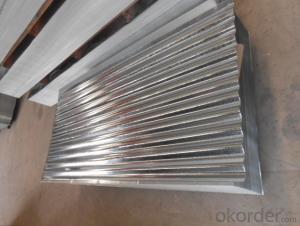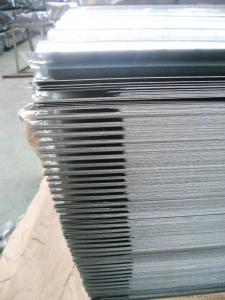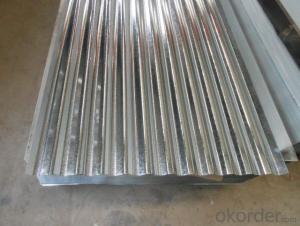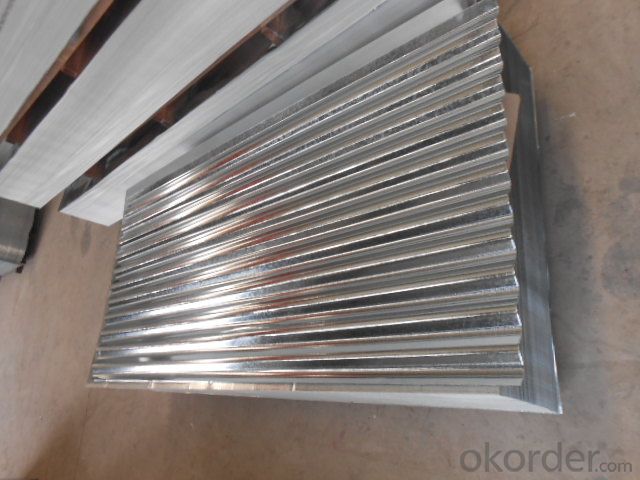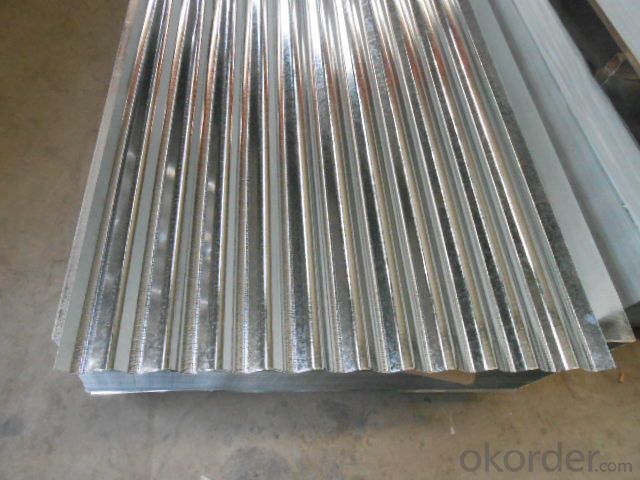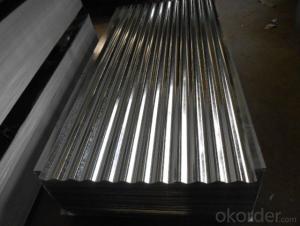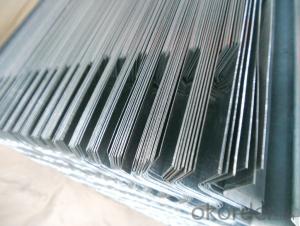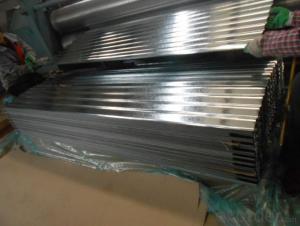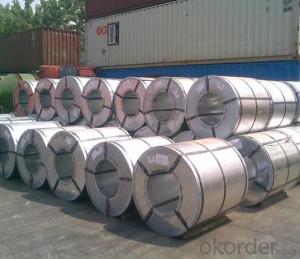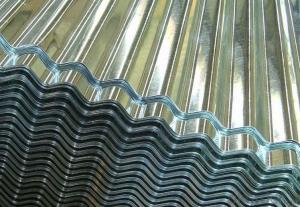Hot Dip Galvanized Steel-Sheet Corrugated
- Loading Port:
- Tianjin
- Payment Terms:
- TT OR LC
- Min Order Qty:
- 50 m.t.
- Supply Capability:
- 1000 m.t./month
OKorder Service Pledge
OKorder Financial Service
You Might Also Like
Description:
It can satisfy the especially designing demands. It apply on convenient construction, and anti-seismic performance, fire proof, waterproof, free of maintenance
Base sheet : galvanized steel sheet
Corrugated steel sheet is the galvanized steel plate which has been wave formed with the cold rolling treatment, trough especial coated dispose
Pressing steel panel with the clear line, and many colors for choice, suitable for any different building style materials, achieving satisfy effects;
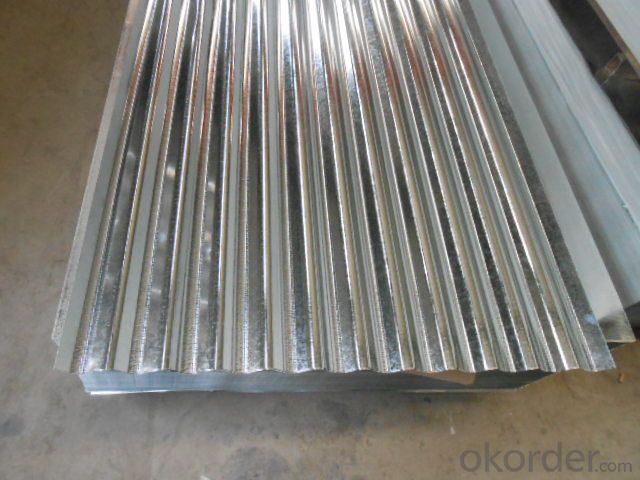
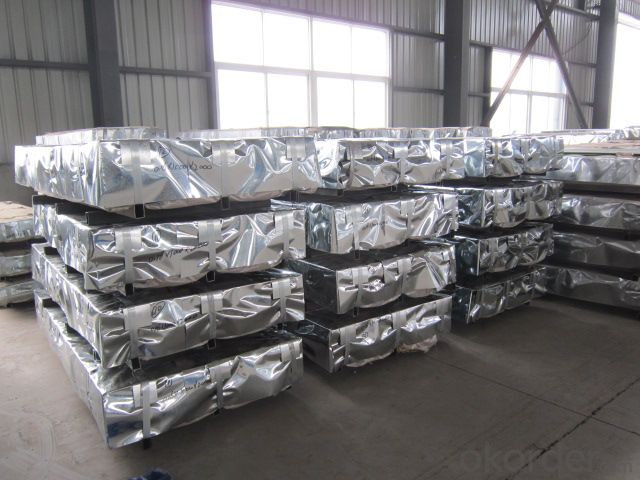
Application:
With excellent cold bending molded manufacturablity, good decoration effect, strong anti-corrosion ability, are also pollution-free and easily recycled. Accordingly, they can be used as final products and basic plates of color coated steel coils and widely applied in construction, home appliances, decoration
Product Specification:
Thickness tolerance: (+/-0.01mm)
Zinc coating: 60-180g/m2
Standard:JIS G 3302, SGCH
Package:3 ton/pallet
Specs: 0.18-0.8mm x 900mm x 2000mm
Width:900-1250mm
Surface:regular/mini/zero spangle, chromated, skin pass, dry etc.
Package:Standard seaworthy export packing: 3 layers of packing, inside is kraft paper,water plastic film is in the middle and outside GI steel ,sheet to be covered by steel strips with lock.
FAQ:
1.How many pieces for one package?
The pieces for one tone is decided by the thickness of the sheet, but we can make it according to your requirements in the reasonable range.
2. Could you produce the sheets according to our design?
Yes, we can.
3. Do you have pallets for the package?
Yes, we must use pallets for the package in order to load.
- Q: Why is the water stop steel plate placed in the middle of the wall?
- Of course not. It's in the middle of the perfectly accurate, roughly the middle of the wall. General concrete wall, if there is double layer steel bar, placed in the middle of the two layer of steel bar, when placed with short steel welded fixed on the steel skeleton, pay attention to water stop steel plate, not with the structure steel affixed together.
- Q: How are steel sheets packaged for shipping?
- Steel sheets are typically packaged for shipping in a way that ensures their protection during transportation. The packaging process involves various steps to prevent any damage or deformation that may occur during transit. Firstly, the steel sheets are usually stacked on wooden pallets or placed in sturdy steel crates. This helps to provide a stable base and prevents any movement or shifting of the sheets during transportation. The use of pallets or crates also makes it easier to load and unload the sheets onto trucks or containers. To further protect the steel sheets from scratches or other forms of surface damage, they are often covered with a layer of protective material. This can include plastic wraps, paper or cardboard interleaves, or even a layer of oil or rust inhibitor. These protective materials act as a barrier between the steel sheets, preventing any direct contact that may cause scratches. Additionally, steel sheets may be bundled together with steel strapping or wire to keep them securely in place. This bundling process helps to maintain the structural integrity of the sheets and prevents them from shifting or sliding during transportation. Finally, once the steel sheets are properly packaged, they are typically labeled with relevant information such as product specifications, quantity, and destination. This ensures that the sheets can be easily identified and handled correctly at each stage of the shipping process. Overall, the packaging of steel sheets for shipping is carefully done to ensure their safe and secure transportation. By using pallets or crates, protective materials, bundling, and labeling, steel sheets can withstand the rigors of shipping and arrive at their destination in optimal condition.
- Q: Can the steel sheets be used for industrial machinery?
- Industrial machinery can indeed utilize steel sheets. Steel, known for its robustness, endurance, and resistance to damage, is a favored option for constructing industrial machinery. By shaping, cutting, and welding steel sheets, manufacturers can produce diverse components and parts essential for industrial machinery. The adaptability of steel empowers manufacturers to design and fabricate machinery that precisely meets specifications and demands. Furthermore, steel's capacity to endure hefty burdens, extreme temperatures, and corrosive surroundings renders it suitable for a vast array of industrial applications.
- Q: Are steel sheets suitable for swimming pool construction?
- Steel sheets are a great option for constructing swimming pools due to their strength and durability. They are well-known for their ability to withstand the weight of the water and the pressure applied to the pool walls, providing a stable and sturdy structure. Furthermore, steel sheets can be easily shaped and joined together in different sizes and forms, allowing for customized and flexible pool designs. In addition, steel is resistant to corrosion, which is essential for maintaining the pool's integrity, particularly when exposed to chlorinated water. This makes steel sheets a dependable and widely chosen material for swimming pool construction.
- Q: Can steel sheets be used for bulletproof applications?
- Indeed, steel sheets possess the ability to serve in bulletproof capacities. Steel, renowned for its strength and durability, effectively halts bullets from breaching its surface. Industries commonly employ bulletproof steel sheets during the production of armored vehicles, military apparatus, and personal protective equipment, including bulletproof vests and helmets. The bulletproof capabilities of these steel sheets hinge significantly upon their thickness and quality. Manufacturers can tailor the design of steel sheets to withstand an array of ballistic threats, encompassing handguns to high-powered rifles. Moreover, steel's affordability and ease of production render it a favored selection for bulletproof applications across diverse sectors.
- Q: Stainless steel plate how to cast mirror plate?
- Our company specializes in stainless steel surface treatment, providing all types of stainless steel pickling and passivation processing business.The company adopts advanced passivation process and self matching passivation reagent, according to your passivation requirements for the preparation of products, targeted, fully guarantee your passivation process all the requirements.
- Q: How do steel sheets perform in corrosion resistance?
- Steel sheets perform well in corrosion resistance due to the presence of alloying elements like chromium and nickel, which form a protective oxide layer on the surface. This layer acts as a barrier, preventing the steel from coming into direct contact with corrosive agents, thus enhancing its durability and longevity.
- Q: Are steel sheets resistant to impact or damage?
- Yes, steel sheets are generally resistant to impact or damage due to their high strength and durability.
- Q: What are the different joining methods for steel sheets?
- There exist several methods for joining steel sheets, each with its own benefits and applications. 1. Welding, a widely used method, involves melting and fusing the sheet edges together with heat. Various welding techniques, such as arc, MIG, TIG, and spot welding, are available. Welding ensures robust and durable joints but demands skilled operators and can be time-consuming. 2. Bolting, another method, employs bolts or screws to connect steel sheets. This method is commonly preferred when disassembly or maintenance is necessary. Bolting guarantees strong and reliable joints, and it is relatively simple and quick. However, it may involve drilling holes and result in a less visually appealing appearance compared to welding. 3. Riveting, a method utilizing metal pins or rivets, effectively joins steel sheets. Rivets are inserted through pre-drilled holes and then deformed or expanded to secure them in place. Riveting ensures strong and secure joints, commonly used in applications requiring high shear strength. Nevertheless, it can be time-consuming and necessitates specialized tools and skills. 4. Adhesive bonding involves using specialized adhesives or bonding agents to join steel sheets. The adhesive is applied between the sheets and forms a strong bond as it cures. Adhesive bonding provides excellent aesthetics, leaving no visible joints, and evenly distributes stress across the joint. It finds common use in industries where welding or other methods are unsuitable, such as automotive and aerospace sectors. 5. Clinching utilizes mechanical force to join steel sheets. It entails deforming the sheet edges to interlock them and create a strong joint. Clinching is cost-effective as it does not require additional materials like fasteners or adhesives. However, it may not be suitable for applications requiring high load-bearing capacity. Ultimately, the choice of joining method for steel sheets depends on factors such as the application, desired strength, aesthetics, time constraints, and cost considerations. Each method possesses its own advantages and limitations, necessitating the selection of the most appropriate method for the specific project requirements.
- Q: Can steel sheets be customized in terms of thickness?
- Indeed, thickness customization is possible for steel sheets. Steel sheets are produced in a variety of thicknesses to accommodate diverse applications and demands. The manufacturing process allows for the customization of a steel sheet's thickness based on the customer's specific requirements. This customization feature provides versatility and adaptability, enabling steel sheets to be utilized across a broad spectrum of industries such as construction, automotive, manufacturing, and fabrication. By tailoring the thickness of steel sheets, they can effectively fulfill the precise needs for strength, durability, and structural integrity in any given project.
Send your message to us
Hot Dip Galvanized Steel-Sheet Corrugated
- Loading Port:
- Tianjin
- Payment Terms:
- TT OR LC
- Min Order Qty:
- 50 m.t.
- Supply Capability:
- 1000 m.t./month
OKorder Service Pledge
OKorder Financial Service
Similar products
Hot products
Hot Searches
Related keywords
